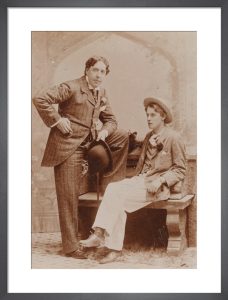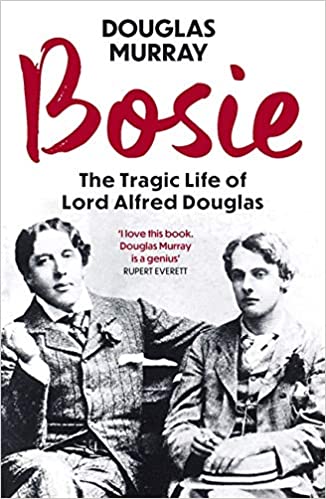What I’m reading: Lord Alfred – Oscar Wilde’s toyboy and nemesis
Douglas Murray: BOSIE
This detailed and thoroughly researched biography of Lord Alfred Douglas was published over twenty years ago, so mine is a rather late review. Bosie here comes across as a bitter, vindictive man torn between love and hate for Oscar Wilde, whose downfall was brought about as much by Bosie and his father as by his own love of life in the gutter (from where, as we know, there is a view of the stars).
The young Bosie has been accurately portrayed in all the movies: lazy, spoiled and petulant. He graduated from college flirtations to commercial sex with London rent-boys (then called ‘renters’). Wilde was going to seed by the time they met; Bosie’s infatuation was more for the playwright and wit than for the bedroom partner. But he loyally visited Oscar every day while he was awaiting trial for sexual offences after the collapse of his libel case against Bosie’s father, the Marquess of Queensberry.
Breaking an oath to his wife that he would not see Bosie again, Wilde was reunited with him in Rouen after his release from prison. They lived for some months in a rented villa near Naples where Oscar wrote ‘The Ballad of Reading Gaol’, his last work, and Bosie wrote some of his best poems. The pair were forced to separate when first Mrs Wilde (reverting to her maiden name Constance Holland) and then Bosie’s mother withdrew their financial support.
Bosie did not see Wilde during his last days in Paris in 1900, but he paid for Oscar’s funeral. Less than two years later he married Olive, a fellow poet with (some say) lesbian leanings. They had a son who ended up in a mental hospital, and although the marriage failed they remained friends and confidants until Olive’s death in Hove in 1944 (Bosie died, also in Sussex, a year later).
Douglas Murray believes Bosie ‘went straight’ after he converted to Catholicism and married Olive. But he never could not let go of the past. He wrote several books about his relationship with Wilde and got involved in a long series of libel cases, many centred on Robert Ross, Oscar’s ‘ex’ from way back who deserves much of the credit for safeguarding Wilde’s legacy, the plays. Bosie edited a series of short-lived literary magazines and ‘discovered’ some notable poets, including Siegfried Sassoon and Rupert Brooke. He took against the emerging modern poetry after the Great War and especially hated T.S. Eliot, never missing a chance to slag him off in letters to, among others, Bernard Shaw and Marie Stopes!
Murray’s major achievement is perhaps in arguing the case for Bosie to be recognized as a poet of some significance. Several critics of the time (and again when he was republished in the 1950s) rank Alfred Douglas’s sonnets alongside Shakespeare’s. How highly is he rated today? His early poems (many invocations to ‘the love that dare not speak its name’) are a bit twee. The middle ones are vituperative, reflecting his long period of litigiousness. Then sanctimony gets the better of him as he becomes an increasingly hardcore Catholic and denounces homosexuality.
This is not an easy book to read, especially for non-poetry lovers. Full of a queeny bitchiness and endlessly self-pitying, Alfred Douglas was neither lovable nor likeable. In death as in life, Bosie gets co-star status in the drama of the rise and fall of a great literary figure.

